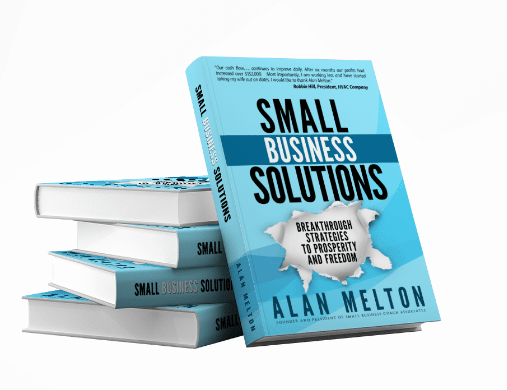VIEW BY TOPIC
- Finding Customers
- Business Systems
- Managing Employees
- Leadership
- Managing Money
Related Posts

Ready to Grow Your Business Fast?
Here’s How I Grew Five Businesses, and Eventually Sold One to a Fortune 500 Company.

5 All-Too-Common Small Business Problems – How to Avoid Them
Compelling research has shown that in the US alone, approximately ≥ 18% of businesses in the private sector fail within the first year. Of course, the number gets even higher towards the second to the fifth year of operation. More often than not, these failures are caused by certain problems that the owner didn’t anticipate on time, solve, or avoid. With this having been said, here are five all too common small business problems and how to avoid them.
1. Not Budgeting Enough for Quarterly Tax Payments
Depending on the type and structure, small businesses will have various tax obligations. And when the time comes to give to Caesar what belongs to Caesar, many small business owners tend to suffer shivers, stress, and headaches.
You want to be on the right side of the law by avoiding tax fraud, underreporting income, and overreporting expenses. You also want to understand your deductions so you can save money, avoid lagging behind on the tax-filing deadline, and distance yourself from possible tax evasion penalties.
To make things easier, many businesses prefer making quarterly tax payments, which are basically estimates reflecting the total tax liability owed to the IRS. You can do this with the help of a quarterly tax calculator, which helps you calculate estimated taxes as self-employed and whether you earn employment income from elsewhere.

It helps make things easier since, by the time the April deadline approaches, you will have done literally 75 percent of the work if not more.
Budgeting enough for quarterly tax payments is also a good way to avoid legal implications associated with taxation laws, which are among the many reasons that businesses go down the path of failure.
2. Cash Flow Hurdles
This is perhaps the most common reason why businesses fail. They simply run out of cash or don’t have enough to keep operations going when it’s most needed.
Cash flow challenges can stem from a wide range of factors, including financial misappropriation, risky investments, bad loans, uncollected invoices, or poor financial decisions.
To avoid what can possibly stagnate your business or force it into closure, it’s best to keep a keen eye on your bottom line as well as expenses.
It’s best to stay ahead by ensuring you have enough money in your bank account to cover operating expenses for at least the next 6 months if not more. As part managing your business working capital, other things you can do to avoid cash flow problems include:
- Regularly forecast cash flow
- Always assess a client’s creditworthiness before doing business with them
- Do away with bad debts
- Keep your operational risks minimal
- Look into ways to reduce operational expenses
- Get financial assistance if need be
3. Payroll Issues
The last thing you want when you start a new business is a payroll crisis. Whether you start as a one-person entity or a small team of five or more, it’s best to have a payroll in place as early as possible.
Payroll issues such as miscalculated payments, late payments, missing benefits, or unreported taxes can be downright frustrating to any business. They can easily bring a business to a standstill and even skyrocket your stress levels as an entrepreneur.
The good thing is, however, that payroll issues can be minimized if you do the following:
- Check your payroll regulations for the country you’re in
- Understand and know all the forms you’ll have to complete
- When filing a payroll, be sure to utilize your deductions
- Ensure accuracy in calculating employees’ wages
- Classify employees properly
- Have clear payroll policies in place
- Try as much as possible not to miss important payroll deadlines
- Stay organized, tracking employee hours worked, overtime, benefits, and other important information
4. Administrative Issues
By far, there are two types of administrative headaches small businesses commonly face. These are paperwork and people. It’s never too early to prepare for administrative challenges that will arise when you start a business. If you have the time and budget, you want to start documenting and planning what you can do to ensure a smooth start.
From bookkeeping to HR, and payroll, different small businesses may have different needs when it comes to admiration. One of the best ways to avoid administrative problems is to outsource some if not all administrative functions to a trusted service provider.
This is especially when it comes to strenuous tasks like bookkeeping, processing paperwork, and payroll processing. Many companies are available to also help keep track of sales, invoices, purchases, payments, expenses, and financial statements at a considerable fee.
5. Marketing Small Business Problems
It goes without saying that marketing is one of the most important elements in a business. It’s literally what puts your brand out there, attracts sales, and eventually bumps up your profit margin.
However, problems may arise if you don’t have a solid marketing strategy for your small business enough to reach clients from different sources online and offline. A few ways to avoid these problems include:
- Budgeting properly for marketing resources
- Keep a close eye on marketing trends and technology
- Invest more in internet marketing, including SEO, social media ads, PPC campaigns, and more
- Seek counsel from a reputable digital marketing expert
The best way to avert small business problems is to anticipate it and to have a plan to keep it at bay. As far as your small business is concerned, the above are just some of the commonly expected issues and how you can ward them off.















